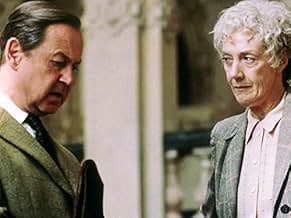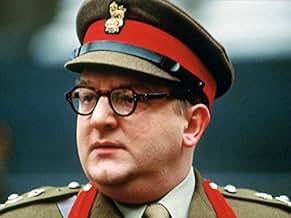CALIFICACIÓN DE IMDb
7.5/10
564
TU CALIFICACIÓN
La secuencia de doce volúmenes de la novela de Anthony Powell «A Dance to the Music of Time» ha sido dramatizada para la televisión.La secuencia de doce volúmenes de la novela de Anthony Powell «A Dance to the Music of Time» ha sido dramatizada para la televisión.La secuencia de doce volúmenes de la novela de Anthony Powell «A Dance to the Music of Time» ha sido dramatizada para la televisión.
- Ganó 1 premio BAFTA
- 3 premios ganados y 5 nominaciones en total
Explorar episodios
Opiniones destacadas
I have to disagree with Mary Smith from America who said that this series was better than Brideshead Revisited. A Dance to the Music of time is almost completely devoid of any charismatic or otherwise engaging characters, with the exception of the likeable Stringham and the repulsive Widmerpool. It gestures towards Brideshead far too obviously (perhaps this was inevitable given the subject matter and the era) and in a way that only demonstrates its relative inferiority. The dialogue and direction are far too stagey, with the result that the character's words just don't ring true. Moreover I felt no concern for any of the characters: they wander aimlessly through their lives and we are offered nothing more than disconnected snapshots to develop our interest. There seems to be no analysis of or motivation for any of their actions: one character kisses another, some people get married, some divorce and some die. There is little by way of analysis: we "see" a lot, but understand (or care for) little of what goes on.
I confess that I enjoyed this series in parts. The costumes really are very good and the better actors do try valiantly with this stilted and sterile script. But it really is almost embarrassing compared to the infinitely superior Brideshead. Apart from a few entertaining scenes involving people dying at parties, and a rather enthusiastic display of nudity in the early scenes, this mini-series is really only for those who have read the books, and even then only as a curiosity piece.
Perhaps I have come to expect too much of British mini-series after being spoilt by productions such as Brideshead Revisited, Martin Chuzzlewit and Pride and Prejudice. Nonetheless, A Dance to the Music of Time is a barely entertaining, wasted opportunity.
I confess that I enjoyed this series in parts. The costumes really are very good and the better actors do try valiantly with this stilted and sterile script. But it really is almost embarrassing compared to the infinitely superior Brideshead. Apart from a few entertaining scenes involving people dying at parties, and a rather enthusiastic display of nudity in the early scenes, this mini-series is really only for those who have read the books, and even then only as a curiosity piece.
Perhaps I have come to expect too much of British mini-series after being spoilt by productions such as Brideshead Revisited, Martin Chuzzlewit and Pride and Prejudice. Nonetheless, A Dance to the Music of Time is a barely entertaining, wasted opportunity.
They don't make adaptations like this any more - no doubt for cost reasons and a lack of imagination and bravery at the TV companies. 7 hours of solid drama, yet full of incidental humour and some very fine characterisations.
Unfortunately it is flawed, and the flaws make it just very good viewing rather than the excellent series it should have been. The biggest flaws to my mind are:
1 The decision to replace Nick and his wife by new actors for Film 4 was totally wrong. Nick ages far too much in too short a space of time, and looks completely different. This creates a real problem of believability.
2 Still on ageing, some of the actors are 'aged' very well, whilst others (especially the ladies and Odo) seem hardly any different as the decades progress.
3 Film 4 is by far the weakest, though to be fair this reflects the books on which it is based. Perhaps it should have been cut further and the earlier years given even greater prominence.
4 Despite a great deal of pruning, there are still too many characters and insufficient narration for non-aficionados of the books to be sure all the time of who is who.
5 The scenes often seem to be a succession of dramatic deaths - difficult to avoid with the way the story has to be condensed, but very predictable nonetheless.
However, it's still pretty good, and light years removed from much of the dumbed-down drama on TV today.
Unfortunately it is flawed, and the flaws make it just very good viewing rather than the excellent series it should have been. The biggest flaws to my mind are:
1 The decision to replace Nick and his wife by new actors for Film 4 was totally wrong. Nick ages far too much in too short a space of time, and looks completely different. This creates a real problem of believability.
2 Still on ageing, some of the actors are 'aged' very well, whilst others (especially the ladies and Odo) seem hardly any different as the decades progress.
3 Film 4 is by far the weakest, though to be fair this reflects the books on which it is based. Perhaps it should have been cut further and the earlier years given even greater prominence.
4 Despite a great deal of pruning, there are still too many characters and insufficient narration for non-aficionados of the books to be sure all the time of who is who.
5 The scenes often seem to be a succession of dramatic deaths - difficult to avoid with the way the story has to be condensed, but very predictable nonetheless.
However, it's still pretty good, and light years removed from much of the dumbed-down drama on TV today.
At long last, Anthony Powell's 12 volume novel sequence A Dance to the Music of Time has been dramatised for television. If Powell's "Journals" are to be believed, this is after any number of false starts spanning the best part of 20 years. The dramatisation was in four two-hour episodes, each covering approximately 3 books. They were shown on UK's Channel 4 TV in October 1997. The format of four 2-hour films was, in many ways, unfortunate as it severely constrained the amount of the action which could be shown, however given the exigencies of modern TV scheduling it was probably the only way in which "Dance" was ever going to get televised. As a devotee of the books, I was apprehensive about how they would translate into film. Just how do you condense 12 novels into 8 hours of television? However in my view the dramatisation worked extremely well, notwithstanding the necessary omissions. What helped the whole production was some interesting, and at times inspired and doubtless extravagant, casting which included: Edward Fox (as Uncle Giles), Zoë Wanamaker (as Audrey Maclintick), John Gielgud (as St John Clarke), Alan Bennett (as Sillery), Miranda Richardson (as Pamela Flitton)... some interesting choices!! Overall an interesting and enjoyable series. I just fear that having been done once that we'll never see "Dance" recreated in a different (better?) format and that Powell will remain relatively unknown in comparison with contemporaries like Evelyn Waugh ... which is in my view quite unjustifiable as Powell is a much better writer. Fortunately Channel 4 released these 4 films on video - which is excellent as they're well worth watching again.
It's possibly a bit late to post this question but as I have only now managed to see the video, here goes anyway. Does anyone know WHY it was deemed necessary to replace James Purefoy and Emma Fielding as Nicholas Jenkins and his wife in the last film of the series? Most of the other characters were left to age, convincingly or otherwise, even Widmerpool himself. Though Joanna David did at least bear a tolerable resemblance to how Isobel (Fielding) might have looked in later life, John Standing, excellent actor though he is, didn't look remotely like an aged James Purefoy. The changeover broke the continuum of events for me and was a constant source of irritation. What was behind this strange, irrational decision?
Though nothing can compare with the books this is quite a fine stab, studded with the finest English talent of its period sensitively cast, and moderately faithful to significant portions of the books. The narrator's voice and perspective are well maintained though oddly James Purefoy is replaced by an excellent but jarring John Standing in the last episode while most of the other actors are cosmetically aged with varying degrees of success. Simon Russell Beale excels but does not dominate as the repulsive Widmerpool and the female characters live as they don't always in the books where they are seen through men's eyes. The music is well chosen and used from Coward's "Twentieth Century Blues" onwards and the use of visual art, including the eponymous Dance is apt.
¿Sabías que…?
- ErroresIn the final segment, when Widmerpool is kissing the feet of the disciples, the edge of his phony hairpiece is clearly visible on the back of his head.
Selecciones populares
Inicia sesión para calificar y agrega a la lista de videos para obtener recomendaciones personalizadas
- How many seasons does A Dance to the Music of Time have?Con tecnología de Alexa
Detalles
- Fecha de lanzamiento
- País de origen
- Idioma
- También se conoce como
- Una danza para la música del tiempo
- Locaciones de filmación
- Productoras
- Ver más créditos de la compañía en IMDbPro
Contribuir a esta página
Sugiere una edición o agrega el contenido que falta











































